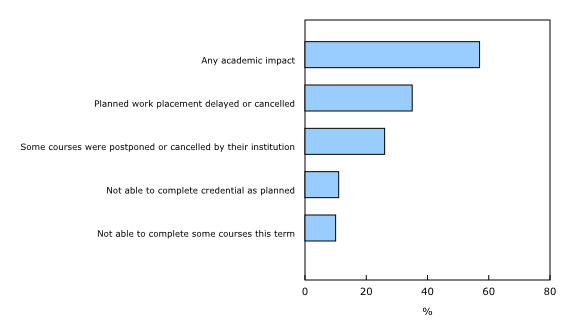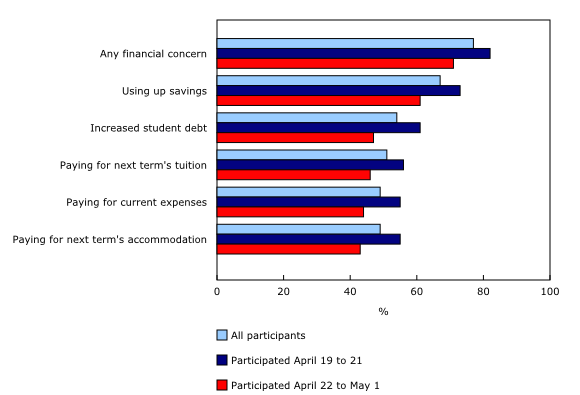Impacts of the COVID-19 pandemic on postsecondary students
Archived Content
Information identified as archived is provided for reference, research or recordkeeping purposes. It is not subject to the Government of Canada Web Standards and has not been altered or updated since it was archived. Please "contact us" to request a format other than those available.
Released: 2020-05-12
The magnitude of the COVID-19 crisis is unprecedented, and the pandemic is having a profound effect on the health, social and economic activities of Canadians. Statistics Canada is committed to supporting decision makers and informing Canadians by generating rich, timely and relevant data and analysis on the current pandemic.
Recently, Statistics Canada drew on its unique relationship with Canadians to develop a new initiative to generate data and analysis quickly and effectively using crowdsourcing. Crowdsourcing questionnaires are being launched regularly to get timely information about important issues, such as the extent to which COVID-19 is affecting the lives and well-being of different groups of Canadians, who are invited to continue visiting the website to participate.
Canadians are facing unprecedented challenges because of COVID-19, and students are no exception. Not only have their studies been disrupted, but many have lost jobs or job prospects, raising concerns about their financial circumstances and their academic future.
From April 19 to May 1, 2020, over 100,000 postsecondary students participated in an online crowdsourcing data collection about how the COVID-19 pandemic is impacting their academic, labour market and financial situation. Statistics Canada would like to thank participants who took the time to answer these important questions during these uncertain times.
Today, Statistics Canada is releasing the initial results from this questionnaire. Readers should note that, unlike other surveys conducted by Statistics Canada, crowdsourcing data are not collected under a design using probability-based sampling. As a result, the findings reported below cannot be applied to the overall postsecondary student population in Canada, but rather only to those who participated in the questionnaire. However, the results provide a snapshot of the experiences of participating students and—given the large number of participants—offer valuable insights.
The majority of participants report an academic disruption as a result of the COVID-19 pandemic
The COVID-19 pandemic led to the physical closure of colleges and universities across Canada, resulting in a shift to increased online classes and many students moving out of residence or student housing. Academic life was disrupted in some manner for the majority of postsecondary students, with 57% of participants reporting that their academic work placements or courses were either delayed, postponed or cancelled.
The most common disruption reported by participants as a result of the COVID-19 pandemic was a delay in or cancellation of their work placement (35%). Just over one-quarter (26%) reported that some of their courses were postponed or cancelled by their institutions, including course work such as labs, applied learning and hands-on instruction that cannot be delivered online.
A further 11% of participants indicated they were not able to complete their degree, diploma or certificate as planned, while 10% were not able to complete some of their winter-term courses.
When participants expecting to graduate in 2020 were compared with continuing students, results were similar across academic indicators, with one exception. Twice as many prospective graduates reported that they would not be able to complete their degree, diploma or certificate as planned (17% versus 8% for continuing students).
Among prospective graduates who would not be able to complete their credential as expected, 54% also indicated that they were very or extremely concerned that their degree, diploma or certificate would not be considered equivalent to those whose studies were not affected by COVID-19.
The pandemic has had a major impact on the employment plans of postsecondary students
As was the case for many Canadians, the COVID-19 pandemic also led to substantial labour market disruptions for students, who were more likely to hold less secure jobs in hard-hit industries such as accommodation and food services. This echoes the most recent release of the Labour Force Survey, which showed that the employment rate of students aged 20 to 24 was 29.8% in April, down from 52.5% in February.
In the crowdsourcing questionnaire, postsecondary students were asked about their employment plans at the beginning of March and subsequently asked how these plans had changed as a result of the COVID-19 pandemic.
At the beginning of March, two-thirds of participants reported having firm employment plans or prospects upon finishing their academic term—28% planned to continue with the jobs they held at that time, 18% had a job with a confirmed start date and 22% had employment prospects. A further 26% of participants were looking for work, but had no firm prospects and 6% were not looking for work.
The COVID-19 pandemic affected these employment plans in a number of ways, with many participants losing their job or seeing their job prospects dry up. Of the participants who planned to continue working at the job they held at the beginning of March, the majority had either lost their job (21%) or been laid off (34%) two months later. A further 26% were still working, but working fewer hours. Less than one-quarter (24%) were continuing to work as planned.
The situation was similar among participants who had a job with a confirmed start date at the beginning of March. Almost one-third (31%) reported having lost their job at the time of completing the online questionnaire, with another 40% reporting that their start date had been delayed and 13% reporting that they still had their job.
Of the participants with job prospects at the beginning of March, 6% still had these prospects at the time of collection, while almost half (49%) reported that they had lost these prospects.
Many student participants report significant concerns about their financial situation as a result of COVID-19
Student participants reported that they were feeling the economic impacts of COVID-19. Overall, 58% indicated they were very or extremely concerned about losing their job in the future, and 67% were very or extremely concerned about having no job prospects in the near future. Without jobs or prospects, many returning students were worried about how to pay for future education-related expenses, in addition to their current expenses.
On April 22—in response to growing concerns surrounding COVID-19—the federal government announced the availability of the Canada Emergency Student Benefit (CESB), which provides financial support to students who are not eligible for the Canada Emergency Response Benefit. The announcement of the CESB occurred partway through the collection of the crowdsourcing exercise. This affords a unique opportunity to compare the financial concerns reported by participants who completed the questionnaire before the announcement of the benefit with those who completed it after.
Overall, following the announcement of the CESB, the proportion of returning students who reported that they were very or extremely concerned about their finances decreased across all categories. Despite this decline, a notable number still reported significant concerns.
For example, prior to the announcement of the CESB, 73% of participants indicated that they were very or extremely concerned about using up their savings. This declined to 61% following the announcement.
Similarly, the proportion of participants with significant concerns about paying for tuition next term, increasing their student debt or paying for current expenses declined by 10 to 14 percentage points after the announcement of the CESB, with between 44% and 47% of students reporting they were very or extremely concerned about each of these issues.
In the coming days, Statistics Canada will release two additional articles that highlight the academic impacts and financial concerns of students as a result of the COVID-19 pandemic. These articles will be available in COVID-19: A data perspective, which features the agency's latest releases related to the pandemic. Canadians are invited to provide their input on how the COVID-19 pandemic is affecting them by participating in Statistics Canada's crowdsourcing questionnaires.
Labour market impacts on participants who had employment plans at the beginning of March 2020
Products
The infographic entitled "How are postsecondary students in Canada impacted by the COVID-19 pandemic?" is now available.
Contact information
For more information, or to enquire about the concepts, methods or data quality of this release, contact us (toll-free 1-800-263-1136; 514-283-8300; STATCAN.infostats-infostats.STATCAN@canada.ca) or Media Relations (613-951-4636; STATCAN.mediahotline-ligneinfomedias.STATCAN@canada.ca).
- Date modified:




